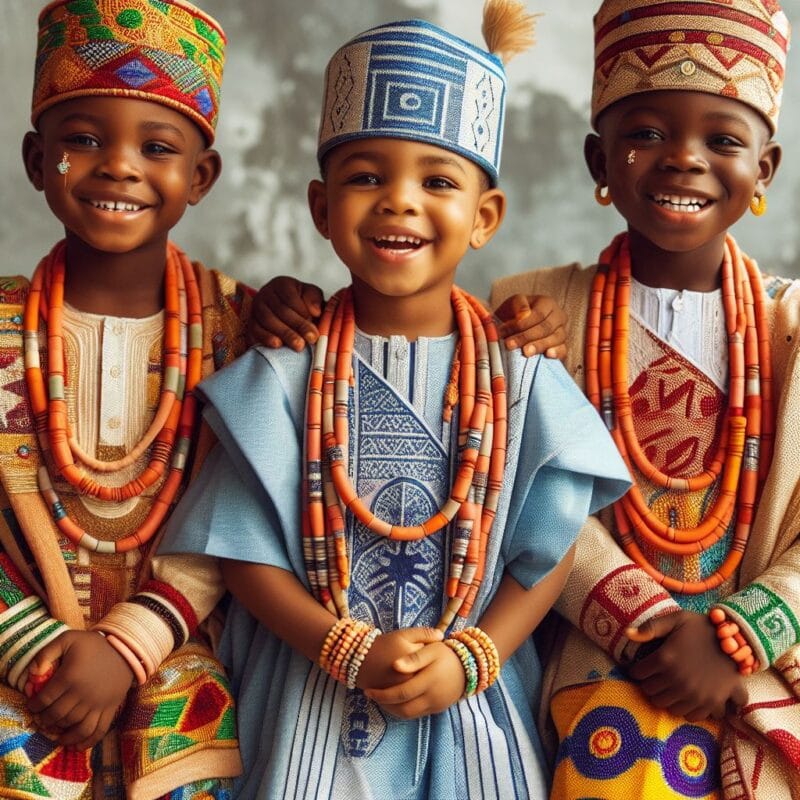How To Pass On Nigerian Culture To Kids As An Immigrant

Our elders always say, ‘There’s no place like home.’ No matter where you are in the world, something will always draw you or your children back home. Passing on your Nigerian culture to your kids is crucial, you don’t want to raise a child who is ignorant of their cultural identity. While it’s great to want your kids to be globally connected citizens, they still need to have knowledge about their homeland. Today, I’ll be answering your questions and providing solutions on how to pass on Nigerian culture to your kids as an immigrant. Let’s explore ways to keep our cultural heritage alive for the next generation!
“How do I balance teaching my kids about Nigerian culture while also adapting to our new life in a foreign country?”
Teaching your child about your Nigerian culture while adapting to a new life can feel daunting, but it doesn’t have to be a big deal. All you need to do is:
- Create Time To share Your Nigerian Culture With Your Kids : Your kids will only get to know about their culture if you start enlightening them about it. Just as you have succeeded in introducing a new culture to them, sharing your cultural values should not be a big deal. While they learn about their new environment, remember to always prepare Nigerian meals, play Nigerian music and also speak your native language at home. While trying to use your native language daily you have to learn to balance your Nigerian language with English language.
- Teach Them Cultural Pride:
Encourage your children to take pride in their Nigerian heritage while also embracing the new culture around them. This means being open to learning about and appreciating the foreign customs, traditions, and values, while also maintaining a strong connection to their Nigerian roots. By doing so, you’ll help your children develop a sense of cultural pride and identity that will benefit them throughout their lives.
Practical tips:
- Create a family calendar that features Nigerian holidays along with local ones.
- Cook traditional Nigerian dishes together while discussing the origins and significance of the ingredients.
- Share personal stories and experiences from Nigeria that highlight values or lessons relevant to your new life.
“My kids are reluctant to learn Nigerian languages; how can I make it fun and engaging for them?”
Kids are usually not interested in anything that bores them.They love to have fun and practically experience what you are teaching them. As a child, before my parents could get me to understand and learn a particular thing, they would always promise me a gift or an outing. For instance, My dad will want me to speak and understand French in school. Meanwhile, it was never a subject I liked but he would always promise an outing if I had a high score and i’m able to speak in french. This made me interested and serious about this subject in school.

When introducing your Nigerian language to your kids it doesn’t have to be boring;
Try games and add rewards to it; believe me, kids love to be rewarded even in their smallest achievements. This can boost their confidence and interest in their cultural learning. One of the easiest ways to help kids learn your language fast is with the use of flashcards. For instance; Hold up a flashcard and have your child name the object in their native language. If they are able to complete 80%-90% do not hesitate to congratulate and reward them.
Other Practical tips include;
- Songs and Rhymes: You can try children’s songs in Nigerian languages. Singing can make learning more engaging.
- Storytime: Read bilingual books that showcase Nigerian tales in both English and your native language.
“How can I pass on Nigerian culture and values to my kids when they are constantly exposed to different cultures and influences?”
Nigerian values like respect, community, and family are timeless and can be intertwined into everyday lessons. Use everyday situations to impart these values. For example, emphasiseemphasise respect for elders by encouraging your children to greet grandparents and family friends politely.
Create a space at home where Nigerian traditions are respected and practisedpractised. A small corner dedicated to Nigerian art, symbols, or quotes can serve as a reminder of their heritage.
Implementing Values
- Family Meetings: Hold regular family discussions about morals, ethics, and personal experiences that align with Nigerian values.
- Service in the Community:Engage in community service as a family to instil the importance of helping others, a value rooted deeply in Nigerian culture.
“I am worried my kids will lose their Nigerian identity; how can I ensure they stay connected to their roots?”
Maintaining a strong sense of identity is important for your children’s confidence and self-worth. Create a family culture that honours Nigerian traditions while embracing their new environment. Encourage your kids to express their opinions about their identity and listen to how they feel about being Nigerian immigrants.
Incorporating Nigerian symbols, art, and literature into your home can create a tangible connection to their heritage.
Staying Connected:
- Home Decoration:Use Nigerian artefacts, fabrics, or portraits to create a cultural ambiance in your home.
- Cultural Education:Enrol them in classes where they can learn about Nigerian culture, whether it’s dance, music, or craft classes.
“How can I connect with other Nigerian parents who share similar experiences and challenges?”
Connecting with other Nigerian families can provide support, friendship, and resources. Start by searching for community groups in your area or online platforms where like-minded parents gather.
Finding Community:
- Social Media Groups: Join Nigerian language groups on platforms like Facebook or WhatsApp.
- Cultural Associations: Look for cultural associations in your city that celebrate Nigerian heritage. They often host events and activities for families.
“My kids are interested in learning about Nigerian history; where do I start, and what resources are available?”
When your kids express interest in Nigerian history, it’s a great opportunity to bond over shared learning experiences. Start with Language learning enrolment, age-appropriate books and documentaries that provide a foundational understanding of Nigerian history, cultures, and significant figures.
Do some research to find local libraries or youtube videos that focus on African history, and visit museums showcasing African art and culture whenever possible.
Resources:
- Language learning programs: Enrol your kids in Nigerian language learning programs. LearnWazobia is a great place to start as many parents have enrolled their children and have good reviews. Get flashcards and worksheets to make language learning easier.
- Books: Find children’s literature that dive into Nigerian history or folk tales.
- Documentaries:Explore documentaries that showcase Nigeria’s diverse cultures, like “Nollywood” films that represent the country’s identity and history.
“What are some common mistakes I should avoid when passing on Nigerian culture to my kids?”
When striving to instil Nigerian culture, it’s vital to avoid common pitfalls that may discourage your children. One of the biggest mistakes is being overly strict about cultural practices, this can lead to resentment.
Instead, approach cultural education with enthusiasm; and celebrate the culture without pressure. It’s also essential to recognize that your children will form their unique identity and relationship with their Nigerian heritage.
Mistakes to Avoid:
- Over-Pressure:Don’t force them to embrace cultural practices they’re resistant to. Understand and identify what they enjoy about their heritage.
- Neglecting Individuality: Allow them the freedom to express their identity, which may be a blend of Nigerian and local influences.
Conclusion
Teach your kids about Nigerian culture by making it fun and part of their daily life. Share stories, traditions, and values with them, and be patient. This will help them stay connected to their roots.
You can also join LearnWazobia Today to build kids who can confidently speak their Nigerian language like Igbo, Yoruba or Hausa and also value their cultural Heritage.








Responses